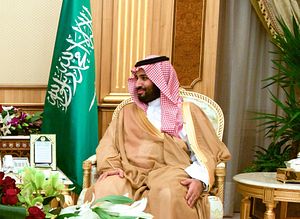Chinese Vice Premier Zhang Gaoli made a three-day visit to Saudi Arabia from August 23 to August 25. During his visit, China and Saudi signed a series of deals worth nearly $70 billion. Zhang said that China-Saudi Arabia cooperation was going to enter a new, more robust, sustainable, and fruitful era.
China and Saudi Arabia’s relationship is getting significantly warmer recently. Days Before Zhang’ visit, Saudi Minister of Energy, Industry, and Mineral Resources Khalid Al-Faleh had just visited Beijing and met with Zhang on August 18. In the meeting, both sides vowed to strengthen economic ties.
Soon, Zhang met Khalid Al-Faleh again in Jeddah on August 24. During the meeting, Al-Faleh revealed that China and the Kingdom had signed 60 various agreements and memoranda of understanding worth nearly $70 billion, according to Saudi Arabian news agency SPA. China’s news agency Xinhua said the agreements covered investment, trade, energy, postal service, communications, and media.
Besides Al-Faleh, the two most important figures Zhang met were Saudi King Salman bin Abdulaziz Al Saud and Saudi Crown Prince Mohammed bin Salman.
The meeting with the crown prince is particularly noteworthy. As King Salman’s favorite son, Mohammed was just appointed crown prince in June 2017. As first deputy prime minister, minister of defense, and president of the Council for Economic and Development Affairs, the crown prince, 31, is the de facto person in charge of Saudi foreign policy, security and the oil industry—the country’s main source of wealth. He is also known for his ambition, or—from perspective of his critics—aggression.
Showing his ambition for the country, the crown prince in 2016 initiated a national strategy called “Vision for 2030,” aiming to make the Kingdom a global investment powerhouse and the heart of the Arab and Islamic world while also diversifying the country’s economy, which is heavily dependent on oil.
His vision seems to match well with China’s Belt and Road Initiative, which was put forward by Chinese President Xi Jinping in 2013.
Since 2016, the crown prince has started to pave the road to cooperating with China. In August 2016, he led a committee to Beijing, met President Xi Jinping and signed 15 agreements with his Chinese counterpart. The trip was seen as the start of a closer relationship between China and Saudi Arabia.

































